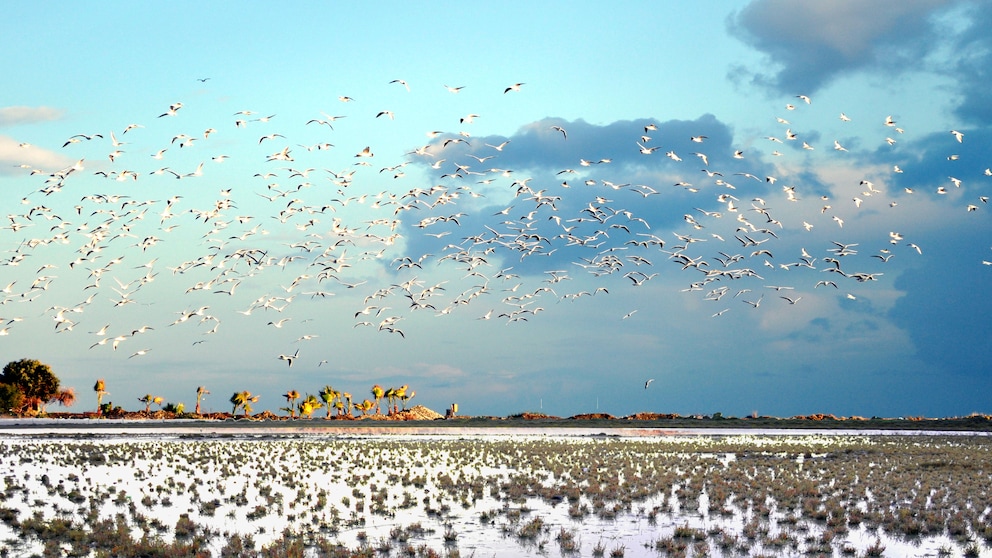July 14, 2025, 11:54 am | Read time: 4 minutes
Every year, hundreds of thousands of migratory birds fall victim to illegal bird hunting in Cyprus. PETBOOK investigated why this is still possible despite the EU ban, who profits from the bloody business, and how animal rights activists are fighting against it.
Cyprus – a Hotspot of Biodiversity
Located in the eastern corner of the Mediterranean, Cyprus attracts millions of migratory birds. They are either on their way to Europe in the spring or taking a break on the island in the fall on their way to Africa. Without this stopover, many animals could not reach their destination. “The distances birds cover on their journey to winter quarters are impressive. We’re talking about thousands of kilometers,” says Martin Hellicar, scientific director of BirdLife Cyprus in a YouTube video. The conservation organization was founded in 2003. It is dedicated to the protection of wild birds, their habitats, and the preservation of Cyprus’s biodiversity. According to Hellicar, the birds’ journey can take one to two months, depending on their condition, diet, and weather conditions–twice a year.
Of the 407 species recorded on the Mediterranean island of Cyprus to date, only 54 live permanently in Cyprus. Among them are the Cyprus wheatear, the Cyprus warbler, and some subspecies that are mainly found in the Troodos Mountains. The rest are migratory birds such as the blackcap, hoopoe, or robin.
Why Migratory Birds Are So Important
In the ecosystem, migratory birds play an important role in global biodiversity. They …
- consume pests, thereby reducing the use of pesticides,
- disperse plant seeds, promoting reproduction and genetic diversity, and
- actively shape habitats, which also contributes to promoting biodiversity.
Janice Pahl, nature and environmental information officer at NABU, explains to PETBOOK: “Through their travels and the resulting exchange between different regions and habitats, migratory birds support the maintenance of ecosystem services and contribute to the resilience and stability of ecosystems.”
Also interesting: These Migratory Birds Fly the Farthest
Bird Hunting in Cyprus – Brutal, Banned, Profitable
But this stability is in danger. According to estimates by BirdLife Cyprus, more than 620,000 birds were killed in Cyprus in the fall of 2024 alone. And this, despite the fact that the Protection and Development Game and Wild Birds Act of 1974 (No. 39/1974) has banned the capture of songbirds in Cyprus since 1974.1 2
The ban also includes the use of trapping nets and electronic decoys. These are used to drive the animals into fine-mesh nylon nets stretched between acacia trees. The use of so-called “lime sticks”–branches thickly coated with glue on which birds land, get stuck, and die agonizingly after hours of struggle–is also legally prohibited.
Nevertheless, the trade in birds is widespread. As the British newspaper “The Guardian” cites Cypriot authorities, the revenue from illegal songbird trapping in 2015 amounted to about 15 million euros annually.
Blackcaps Are Considered a Delicacy in Cyprus
The animals find their way into local taverns through the black market. Here they are grilled, fried, pickled, or cooked and sold at high prices under the name ambelopoulia. The birds are served grilled, fried, pickled, or cooked at high prices. However, because the capture methods are indiscriminate, not only the species intended for the dish die.
“Blackcaps are particularly sought after in Cyprus because they are considered a delicacy,” says Janice Pahl, NABU’s nature and environmental information officer. “They are in high demand, as they are considered a delicacy. However, the indiscriminate capture methods result in the death of not only the species intended for the dish, but also other species that are endangered, such as the turtle dove or the nightjar.”
Use of Trapping Nets Has Increased by 76 Percent
The use of trapping nets has increased by 76 percent. This is due to a 2017 change in the law. At that time, Cyprus reduced the fines for using trapping nets from the previous 2,000 euros to 200 euros–a move sharply criticized by animal welfare organizations. In addition, there are personnel issues. In the past, the European Commission has already criticized Cyprus for failing to implement the European Birds Directive (2009/147).

“No Hunter Enjoys Shooting Cats – but It Is Necessary”
What Is Being Done Against Bird Hunting in Cyprus
The numbers show: The challenge remains immense. As long as trapping methods such as nets, lime sticks, and sound devices are used, the problem persists. But animal protection organizations are taking action. “A plot of land in a region known for illegal bird trapping has been acquired and secured for bird conservation in the long term,” says Janice Pahl. Trees and small bodies of water have been created on the site–a safe haven for resting birds.
In the past, the EU Commission has already reprimanded Cyprus for failing to implement the European Birds Directive (2009/147). Animal protection organizations are working to build political pressure and achieve long-term change by documenting where laws are being violated and where trapping methods are being used.

